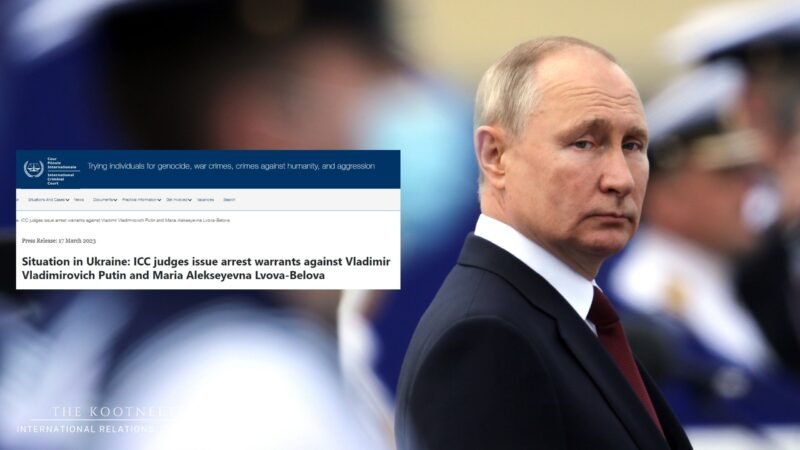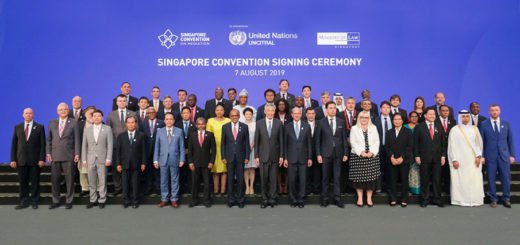ICC Issues Arrest Warrant for Putin on Alleged War Crimes in Ukraine; India Not Bound by the Warrant

The International Criminal Court (ICC) has issued arrest warrants for Russian President Vladimir Putin and Maria Alekseyevna Lvova-Belova, the commissioner for children’s rights in the office of the Russian president, over allegations of war crimes in Ukraine. The warrants were issued on Friday by the Hague-based court, accusing Putin of involvement in the unlawful deportation and transfer of children from occupied areas of Ukraine to Russia.
The ICC stated that there were “reasonable grounds to believe that Mr Putin bears individual criminal responsibility” for the child abductions, “for having committed the acts directly, jointly with others and/or through others (and) for his failure to exercise control properly over civilian and military subordinates who committed the acts.”
Russia has dismissed the move as meaningless, with the foreign ministry spokeswoman, Maria Zakharova, stating that “The decisions of the International Criminal Court have no meaning for our country, including from a legal point of view”. She added that “Russia is not a party to the Rome Statute of the International Criminal Court and bears no obligations under it.”
However, ICC President Piotr Hofmanski said that it was “completely irrelevant” that Russia had not ratified the Rome Statute. “According to the ICC statute, which has 123 state parties, two-thirds of the whole international community, the court has jurisdiction over crimes committed in the territory of a state party or a state which has accepted its jurisdiction,” he said. “Ukraine has accepted the ICC twice – in 2014 and then in 2015.”
The warrants were issued a day after a United Nations-backed inquiry accused Russia of committing wide-ranging war crimes in Ukraine, including the forced deportations of children in areas it controls.
The legal move has provoked a furious response in Moscow, with parliament speaker Vyacheslav Volodin, a close ally of the president, writing on Telegram, “Yankees, hands off Putin!” He added that the move was evidence of Western “hysteria”.
The United States, which is not a member of the ICC, said that “there is no doubt that Russia is committing war crimes and atrocities”. Nevertheless, a spokesperson for the US State Department emphasised that the ICC decision was “reached independently”, separate from the US’s own conclusions.
Ukraine’s Prosecutor General Andriy Kostin welcomed the ICC’s announcement, stating that “the world received a signal that the Russian regime is criminal and its leadership and henchmen will be held accountable”. President Volodymyr Zelenskyy blamed Putin for the deportation of thousands of Ukrainian children, calling it a policy of “state evil which starts precisely with the top official of this state”.
The warrants mean that Putin could be arrested and sent to The Hague if travelling to any ICC member states. “This makes Putin a pariah. If he travels he risks arrest. This never goes away. Russia cannot gain relief from sanctions without compliance with the warrants,” said Stephen Rapp, who was the United States Ambassador-at-Large for War Crimes Issues under former president Barack Obama.
India Not Bound by ICC Warrant for Putin’s Arrest
Despite being issued an arrest warrant by the International Criminal Court (ICC) last week for alleged war crimes, Russian President Vladimir Putin will be able to attend the G20 Summit in New Delhi later this year as India is not a member of the ICC. The Hague-based tribunal issued warrants against Putin and his Commissioner for Children’s Rights, Maria Alekseyevna Lvova-Belova, for allegedly deporting children unlawfully during the Ukraine war.
However, India, which currently holds the presidency of the G20 and Shanghai Cooperation Organisation (SCO), has never signed the ICC’s core treaty, the ‘Rome Statute’. Therefore, the ICC warrants may not affect New Delhi’s invitation to Putin for the G20 and SCO summits. In the past, India has hosted individuals facing action from the ICC, including Sudanese president Omar Hassan al-Bashir in 2015, who was asked to be arrested by the ICC but was not handed over.
Unlike India, South Africa, which will host the BRICS summit in late August 2023, will have to consider the recent ICC warrant against Putin. The BRICS countries include Brazil, Russia, India, China, and South Africa.


















